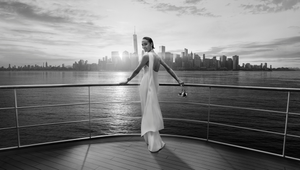
Mastering the Art of Visual Poetry with Iggy London

Studio RM, the creative studio specialising in colour grading and post production across film, print, and digital, is partnering with Little Black Book to sponsor The Directors channel. It’s a space for celebrating directors who create aesthetically beautiful and nuanced imagery, the creative potential of technology, and diving into the trends in contemporary culture which these visionary minds so often spark.
In this series, we’ll be highlighting directors who have a distinctive creative voice, and who are championing new and exciting visual styles through fashion, music, and culture. In this instalment, LBB’s April Summers sits down with Iggy London, who she discovers is a polymathic poet whose creative inspiration stems from a mutual love of spoken word and emotive visuals.
In his short films, Iggy captures the essence of different cultural and societal talking points, through a creative approach that masterfully articulates a startling sense of humanity, while tackling delicate subject matter head-on. In addition to this human-centered work, Iggy has also directed music promos and commercial spots for the likes of Harrods, Nike and Adidas. Here he talks about how spoken word has influenced his body of work, and how colour and grade ties into a film’s visual and emotional identity.
Name: Iggy London
Location: London, England
Repped by: Iconoclast
LBB> What were your influences growing up and how did they help shape your creative voice?
Iggy> Growing up, I was obsessed with American culture (weren’t we all). There was one particular show that I used to watch called Def Poetry Jam. It was this spoken word poetry television series hosted by Mos Def that was broadcast on HBO. Every show would have a selection of poets who performed spoken word and I fell in love with not only the poets’ cadence and flow, but also their content; it felt like a Sunday service of some sort. I grew up watching Daniel Beaty, Saul Williams and Black Ice perform on that stage and share words that felt transcendental for me. It was my key into visual poetry at the time, I just didn’t know it.
LBB> The style of a film changes brief by brief, but how would you underpin your general visual style? Are there certain factors that you could pinpoint as a signature for you?
Iggy> I try not to restrict the way I think about my visual style because it always ebbs and flows. I don’t want to become stagnant. I’ve always been influenced by the environment which surrounds me at the time - summer in New York, winter in Ghana - but if I had to pick a style which has been recurring over the years, it would be creating emotionally charged stories with a visual poetry. Transcendental in nature. These themes can be seen in Fatherhood, the short film I wrote and produced.
As someone who never went to film school, I was excited about the idea of breaking conventions at the start of my career. I played around with different filmic styles but found myself interested in the feeling of the camera constantly moving in my work, it almost becoming a character itself. I guess this has always stayed with me.















